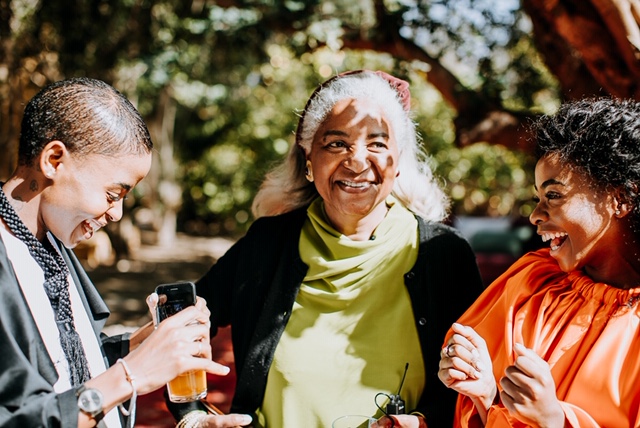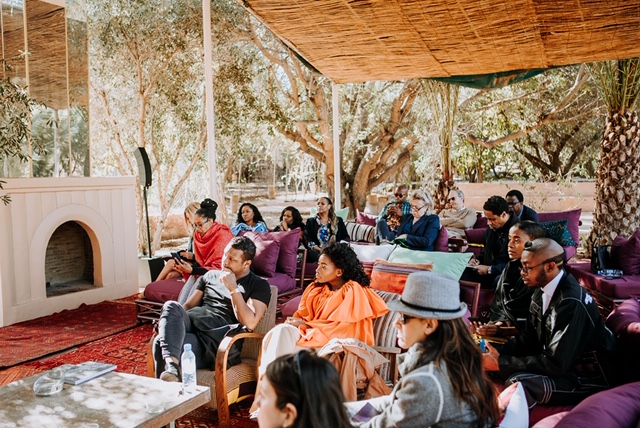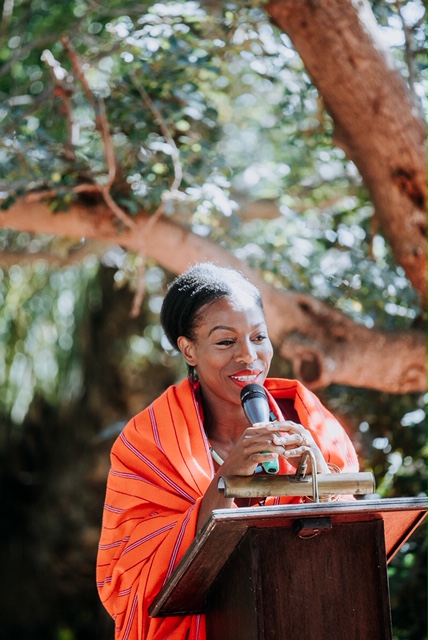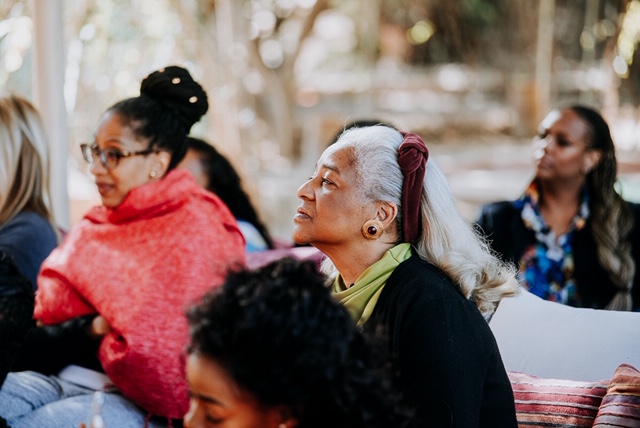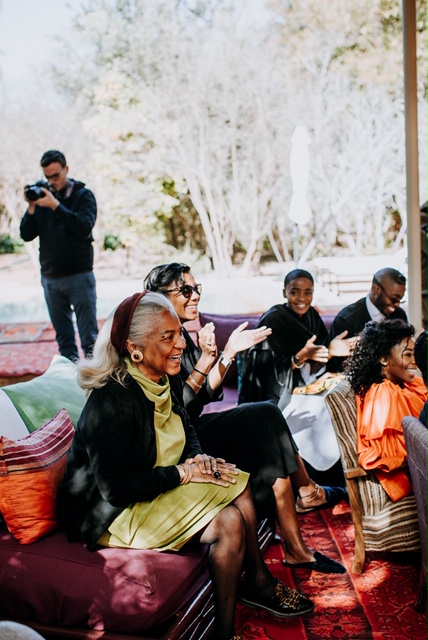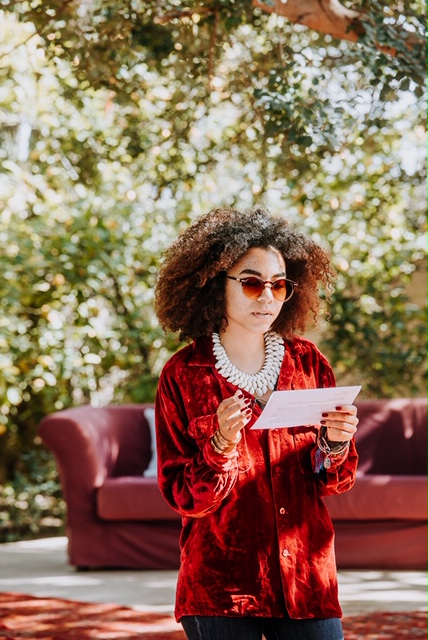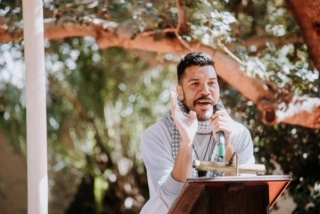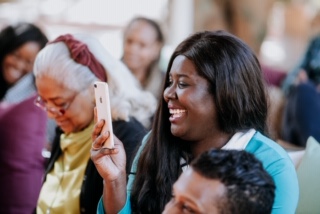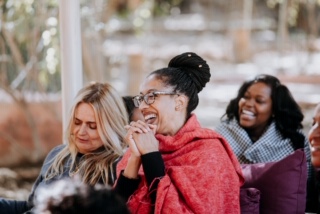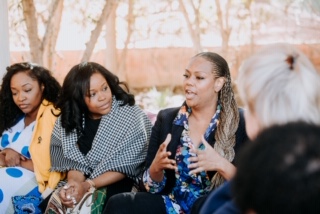Now on its second edition, 1-54 Marrakech has generated new momentum, with dozens of new events, exhibitions, screenings and performances piggybacking on the popularity of the contemporary art fair, which is taking place at La Mamounia Hotel and other locations throughout the city. This year, the most inspiring attraction is a salon hosted from February 21st to 23rd by cultural entrepreneurs Meryanne Loum-Martin, Mashariki Williamson and Roberta Annan. The setting for these open-air conversations couldn’t be more appealing. The Jnane Tamsna, built as a luxury boutique hotel with villas spread across eight acres of vegetable gardens and olive trees in the farming area of the Palmeraie, is owned by Meryanne and her husband Gary Martin, an ethnobotanist from Michigan.
The salon is meant to bring awareness to a new cultural platform celebrating the talent, diversity and global influence of Africa and the African diaspora. “I grew up as a minority everywhere,” says Meryanne, who was born in Côte d’Ivoire to a Senegalese father and a West Indian mother. “I spent my whole life never thinking about it, but now I feel we need a place and an annual event for people who think alike but don’t often have an opportunity to meet. These people may not speak the same language, but they definitely want to express themselves. There are a lot of talented people in Africa and the diaspora. Not all of them are as famous as Virgil Abloh, but we need to support them.”
Meryanne, who was raised across Ghana, England, Russia and France by a Catholic mother and a Muslim father, originally trained as a lawyer in Paris. A resident of Morocco for close to 30 years, her latest experiences as a hotelier and cultural entrepreneur seem driven by her gregarious nature and a desire to express her hybrid identities through creative exchanges. Her co-founder Mashariki is a Jamaican New Yorker who has worked as a writer and brand strategist. Mashariki, who goes by Masha, feels that everyone is currently trying to understand what is happening in culture globally. “Everyone is searching for the next big thing,” she said. “With this platform, which doesn’t even have a name yet, we have an opportunity to highlight some young, talented artists who will get wider exposure.”
Roberta, the third co-founder, is a Ghanaian former United Nations official who joined the venture through her Impact Fund for African Creatives. The 100 million euro fund is meant to support creativity on the African continent. “With the fund, we want to prove that creativity is an asset class that is investable. It’s about building the infrastructure that will turn those African creative ideas into businesses. We have launched fellowships, and we are providing access to market opportunities. In fashion, it could be access to Paris and New York Fashion Weeks. Even though we have chosen a holistic approach to investing in African talent, starting with an accelerator that will help to build businesses up to the point where they are investable, we are focused on the bottom line.”
All three founders seem convinced that Africans in Africa and in the diaspora need to love their own culture and work together. One of the key members of the platform’s advisory council is the Nigerian-Ghanaian novelist Taiye Selasi. Taiye, who revealed that she has been thinking a lot about cultural movements, drew a parallel with the Full Circle Festival, where black celebrities gathered in Accra in the last days of 2018 as a way to pay tribute to their African ancestry and heritage. Taiye spoke about her belief that Africa can become a powerful unified whole, so long as creative collectives accept that they must tell new stories.
In the way that Harlem Renaissance writers including Langston Hugues and Zora Neale Hurston would gather in the salon of Charles S. Johnson, the editor of Opportunity Magazine, or the way that Parisian artists such as Pablo Picasso and Henri Matisse would gather in the salon of Gertrude Stein, Taiye sees Meryanne’s Marrakech salon at the Jnane Tamsna as the sun-filled place where leading African creatives can convene in order to broaden the scope of creative expression, fostering a new spirit of collaboration.
Although the two salons she referenced took place nearly a century ago, Taiye believes that we are about to experience something similar. “I think we are witnessing the flowering of diaspora culture. It’s what Hemingway would have called a moveable feast. The challenge for the diaspora was that we didn’t have a place. We didn’t have a Harlem, we didn’t have a Montparnasse. Now, we have Meryanne’s place in Marrakech. We must all see the magnitude of what we are doing, we are defining a moment in diaspora culture. Every lasting cultural revolution began with a convening like this one in Marrakech. What happened in Harlem was not just for New Yorkers, what happened in Paris was not just for the French, and what is happening here in Marrakech is not just for Africans. It’s for the world.”
Several other advisory council members, including the American entrepreneur and musician Benjamin Bronfman Jr, the Nigerian author Enuma Okoro, the French writer Violaine Binet, and the Liberian branding expert Miatta David Johnson proceeded to introduce themselves, and Masha spoke about the power of belief and manifestation. “Don’t let other people’s limitations influence your life path,” she said. “Something kept compelling me to be here. I knew that I wanted to be here in Marrakech.” Meryanne and her daughter Thaïs Martin concluded the conversation by reading, in both French and English, a statement that had been sent to them by Maryse Condé, the 82-year-old Guadeloupean author who is best known for her novel Segu.
“Only art and culture can keep death in check. In this day and age, this essential truth seems to be forgotten. In the world we live in, anxieties and fears have grown darker. More and more, people fear people because of the color of their skin, their religion, or the language they speak. They have forgotten that difference gives the universe its flavor. What would it be like, if we were all born of the same womb, a bland broth, repugnant to all tastes. However, despite this corridor of darkness, we must keep hope. We must keep faith. One day our sister-in-common, the sun, will reappear. It will shine its light and spread its heat on all those who have continued to exercise their creativity, those who have put their minds to work, all around the world. Yes, tomorrow the world will be beautiful, the earth will be round, just as its creators had dreamed.”
The salon and platform do not yet have a name, but the hashtag is #AFreeCulture

